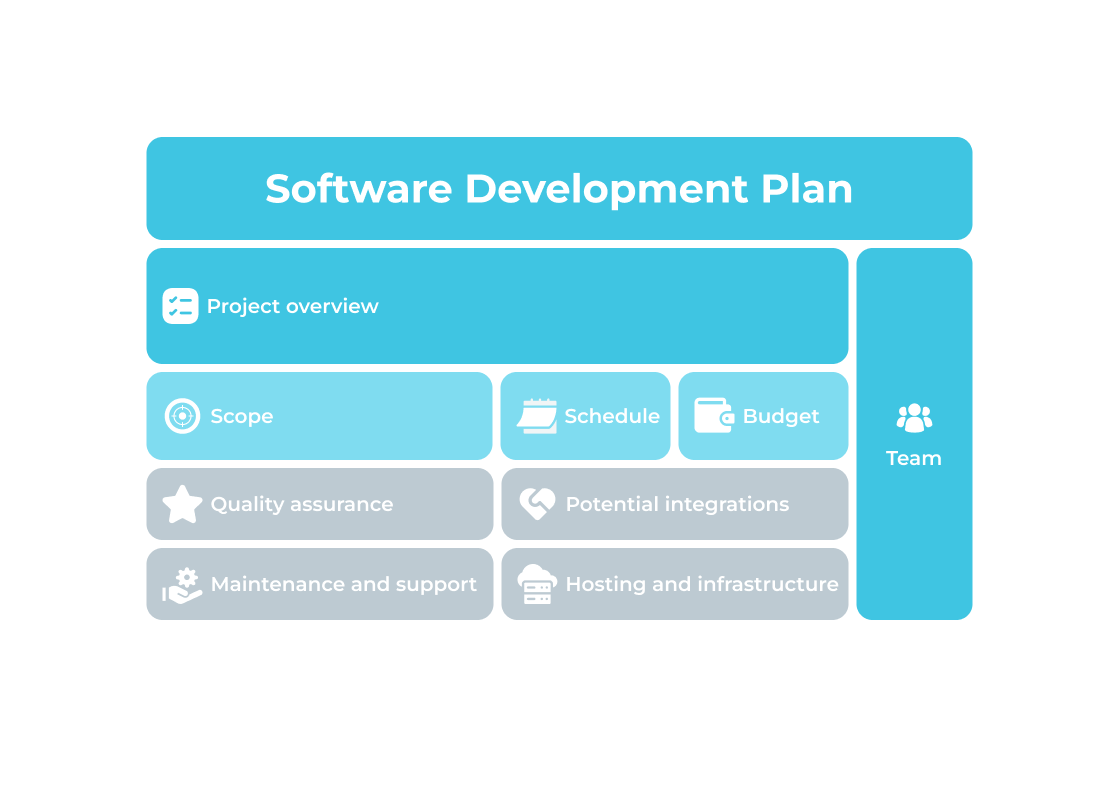How to find a custom software development company in 2024
Key insights from this article
Define your needs and goals
To find the right software company, it is crucial to be clear about the purpose and goals of the custom software solution. Customized software offers increased efficiency, cost savings, scalability, and security.
The most important criteria when choosing a potential partner
These include, for example, the quality of the website, communication of core services, corporate culture, portfolio, experience, flexibility, cooperation models, technology expertise and your impression of the managers. It is crucial to research potential partners thoroughly and assess their compatibility with your needs.
Planning and collaboration
Before signing a contract, ask the software company to draw up a detailed software development plan to give you an overview of the project. After all, transparency and communication are critical to a successful partnership.
You’d like to have an app developed, and you need custom or bespoke software to drive your business needs, net, workflows, and big data forward? So far, so good. But how do you find the right software development company?
With every company claiming to offer the best, you must prioritize finding the closest fit for your purpose. Read on for our guide to navigating this crucial decision for outsourcing your software developments.
Know your why
To find the appropriate software development partner for your business, you must be completely clear on why you require a custom service, whether for blockchain, e-commerce, enterprise software, or modernization. What’s driving your specific needs? What do you want the bespoke software to achieve?
Understanding the numerous benefits of custom software will help you to be clear on why you need it.
- Custom software is developed specifically for your business, considering your needs and requirements, whether for blockchain integration, e-commerce functionality, modern enterprise software, or process modernization. Rather than trying to fit your business into a pre-existing solution, a bespoke software solution will work exactly how you require it to, giving you a digital transformation and a competitive advantage.
- As it is designed to streamline and automate your business processes, custom software can make your operations more efficient. This will save you time and resources, eventually creating custom software solutions that are more cost-effective than off-the-shelf solutions.
- Custom software is scalable and set up to grow with your business, which is especially important for enterprises looking to expand and incorporate blockchain or e-commerce capabilities. As your company develops and changes, the software can be easily modified and updated to meet your evolving needs.
- With custom software, you have more control over the security measures in your business, making your operations safer, which is crucial for companies handling sensitive data.
Be sure to identify the most significant benefits for your project, whether it's related to blockchain, e-commerce, enterprise software, or modernization, and have a clear vision before kicking off your search.
Starting your search
Your journey to finding a custom software development company, whether it's for ERP solutions, Azure cloud integration, or any specific methodology, will most likely start with a search engine (where else!):
Industry websites and registers like Clutch are also valuable places to search for companies that offer custom software development services, especially those specializing in ERP or Azure solutions. Don’t forget to turn to your trusted business and social media networks for recommendations, too. Alternatively, attending industry events, such as a conference or trade show, is also a great way to start networking with software engineers and professionals in the software development industry.
Getting to know potential partners
So, the advantages of custom software development projects are indisputable (improved efficiency, time and resource savings, and a competitive advantage to boot).
Now, make the all-important decision of which experts to trust to deliver the software products you expect to see.
Start by building a well-researched shortlist of potential companies. We’ve compiled the top ten considerations (plus one for luck!) for you to find the best fit.
Embark on your custom software journey with confidence.
Let’s chat.
10 (+ 1) things to look out for when choosing a software development company
- What does their website look like? Is it easy to navigate? This hints at the company’s knowledge of usability and UI design.
- How well communicated are the company’s core services? Can you clearly understand their offering, including product development and digital solutions?
- Does the company’s mission and philosophy align with your company's values? Pro-tip: Take a look at LinkedIn and try to find out more about their culture. Do they have good employee retention or a high turnover? Do they promote flexible working and in ways that promote their best work? This may provide insight into how accommodating the company would be in your collaboration and whether they are well-equipped for virtual communication.
- Does their portfolio of work speak to you? Do they have case studies showing how their end-to-end development process is met with innovative development solutions?
- Do they have long-standing clients? How many years of experience? If businesses have been working with the same company for several years, it tells you more about their quality of work than a single positive client review.
- Does the company maintain a high-quality blog or showcase success stories on its website? A regularly populated blog says a lot about the company’s project management and knowledge of programming languages.
- How many years has the company been operating? More years equals more experience in web development and web application.
- Has the company worked with startups before? To work with startups, companies will have developed agile working processes to meet tight deadlines and keep up with sudden changes in requirements, demonstrating their ability to handle iterations.
- What do their collaboration models look like? Does the company involve clients, for example, in UX design or strategy workshops?
- What does the developer’s tech stack inside the company look like? Are you confident they will use up-to-date technologies and frameworks to help you optimize your software? It is worthwhile to do a little research yourself on the latest trends within the software developer scene. Equipped with a few keywords, you can better assess whether their developers are keeping up with industry best practices and have a robust technology stack.
- How do you feel when talking to the company’s managers? Don’t ignore your gut feeling!
Next steps

So you’ve now got some great potential partners lined up. But before signing on the dotted line with one, you must be completely confident in your selection.
Arranging a workshop is a significant next step to get a feel for your collaboration. Although you’ll likely have to pay for this service, it should prevent you from making a much more costly decision that you later regret. Whether you end up working together or not, you will gain more clarity on your business relationship and software development lifecycle in the long term.
Next, let the dedicated team develop a software development process that outlines your software development project's goals, timeline, resources and deliverables. This should function as a road map for the development team.
A software development plan typically includes the following components:
- Project overview — A high-level project description, including its goals, objectives, and stakeholders.
- Scope — A detailed description of the features and functionality that will be included in the software and any exclusions or limitations.
- Potential integrations — Analysis and definition of the system that the new software has to integrate with. This should include a contact person for the third-party system.
- Schedule — A timeline for the project, including key milestones and deadlines.
- Team — A list of the resources dedicated to working on your project.
- Budget — An estimate of the costs associated with the project, including labor, prototyping, licensing cost of potential third-party systems or APIs that will be used, plus overhead.
- Hosting and infrastructure — An outline of where the application development will be hosted (in the cloud or on an existing on-premises server), IoT, who will provide the necessary framework and infrastructure and how much it will cost.
- Quality assurance — A description of the testing, quality assurance and data analytics processes that will be used to ensure that the software applications meet the specified requirements for both the business and end-users.
- Maintenance and support — A plan for how the software will be maintained and supported after deployment. This should include the company’s availability after the project finishes, its process for handling support cases, and real-time user experience.
Let us drive your business forward
with tailored digital solutions.
Does the one perfect software development firm exist?
After all that, we would rather not let you down. But the truthful answer is probably not! Why not? Simply because we as humans are not perfect either. Therefore, here at Valudio, we genuinely believe that the chemistry between your team and the software company’s team lays the foundation for a successful collaboration (and is as close to perfect as possible).
Successful collaboration requires transparency and open communication above all. Our advice? Don’t hesitate to ask questions! Good queries to clear up at the first meeting include establishing the company’s working hours, availability, communication processes, contact person for the project and approach to feedback.
Selecting the right custom software development company is like selecting new in-house talent. Key requirements must be met, but the interpersonal component, or how thriving teams fit together, is the deciding factor.



